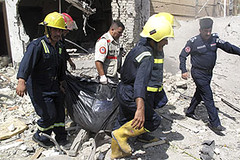
The war continues in Iraq as a result of the United States military occupation. The Congress recently voted to spend another $59 billion to the war going. This photo was taken after a bomb blast.
Originally uploaded by Pan-African News Wire File Photos
20:53 Mecca time, 17:53 GMT
Iraq violence 'worst in two years'
Daily attacks are still carried out, despite increasingly well-trained
Iraqi forces
At least 535 people have been killed in Iraq in the month of July,
making it the country's deadliest since May 2008, according to Iraqi
government figures.
The US military on Sunday, however, took the unusual step of disupting those numbers, saying the real death toll for July stood at less than half of that.
Figures from the Iraqi health, defence and interior ministries show
396 civilians, 89 policemen and 50 soldiers were killed, with another
1,043 people left wounded.
But in a statement e-mailed to reporters, the US military said that
222 people were killed in July, with 782 people wounded.
"The claim that July 2010 was the deadliest month in Iraq since May
2008 is incorrect," the statement said.
The statement did not say how the US military calculated its death toll.
Continued violence
Casualty counts are difficult to tally in Iraq, for a variety of
reasons. Ministries do not always keep accurate tallies, and the
number of fatalities is often adjusted several times, particularly
following major attacks.
Al Jazeera reports for the month showed at least 362 fatalities
occured. Another set of data, provided by a security consulting firm
AKE, showed roughly 300 people killed in July.
Weekly data from AKE shows an increase in violence over the last four
weeksRegardless of the exact number of deaths, violence has apparently increased in Iraq.
On average about 50 Iraqis have been killed each week in 2010,
according to the security firm's data.
In July, though, the death toll stayed at or above that level for four
weeks - the only time this year Iraq has seen such a sustained
"above-average" level of violence.
July also saw an unusually high number of mass-casualty attacks.
Seventy people were killed in the three-day period leading up to a
Shia pilgrimage in Baghdad on July 8. A suicide bomber also killed
more than 45 people west of Baghdad on July 18.
And two car bomb attacks in late July, in Baquba and Karbala, killed
30 and 21 people respectively.
'Holistic view'
US officials have sought to stress Iraq's improved security as they
prepare to withdraw tens of thousands of troops next month.
Lanza called the continued violence "sporadic" and "not unexpected"
[EPA]General Stephen Lanza, the spokesman for the US military in Iraq, e-mailed reporters in July and urged them to provide "context" in
reporting on the Iraqi insurgency.
"I believe it's important to take a holistic view of security in
Iraq," Lanza said in his e-mail.
"Overall, the security situation in Iraq is stable ... yes, there are
violent acts; but certainly, current trends cannot be accurately
characterised as a rise or surge in violence."
Violence in Iraq has dipped markedly from its peak in 2006 and 2007,
when dozens of people were killed each day.
But anti-government fighters do continue to carry out attacks on a
daily basis, taking advantage of a political vaccum left when March
elections left no clear winner.
Iraqi political parties, meanwhile, continue to wrangle over who will
lead the next government.
Source: Al Jazeera and agencies
No comments:
Post a Comment